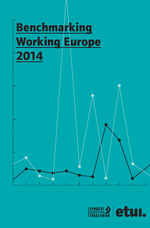ETUI (2014) “Benchmarking Working Europe 2014“, European Trade Union Institute (ETUI) Report, 29 April. The year 2010 saw the launch of the Europe 2020 strategy. The new EU strategy had been devised for the purpose of promoting smart, sustainable and inclusive growth that would help Europe recover from the crisis and re-emerge stronger and more prosperous on the other side. In June of the same year, the European Semester …Read More
Bureaucracy may be the solution, rather than the problem, for issues of European governance
Lodge, M. & Wegrich, K. (2014) “Bureaucracy may be the solution, rather than the problem, for issues of European governance“, LSE EUROPP, 24 April. The European Union is often criticised from the perspective that it has created a layer of bureaucracy or ‘red tape’ which has a damaging effect on European governance. Martin Lodge and Kai Wegrich write that while it is particularly common for political parties to make …Read More
European Banking Union: Status of Implementation and the Need for Improvement
Bauer, M. & Demary, M. (2014) “European Banking Union: Status of Implementation and the Need for Improvement“, Konrand Adenauer Stiftung, 23 April. The crisis in the euro area revealed points of weakness in the architecture of the Monetary Union. It appeared that the common monetary policy also required a common system of banking supervision. This report summarises the current proposals and decisions regarding the Banking Union and evaluates the …Read More
Is German Policy The Greatest Eurozone Threat? A Response To Jürgen Stark
Fazi, T. (2014) “Is German Policy The Greatest Eurozone Threat? A Response To Jürgen Stark“, Social Europe Journal, 16 April. In a recent article published in the Financial Times, Jürgen Stark, a former member of the ECB’s executive board, brings the anti-inflation paranoia that the German establishment has accustomed us to since the start of the crisis to a whole new level. In his commentary, he rebuts the need …Read More
European Banking Union: Current Outlook and Short-Term Choices
Véron, N. (2014) “European Banking Union: Current Outlook and Short-Term Choices”, Statement presented at the conference “Banking Union and the Financing of the Portuguese Economy,” Assembleia da Republica/ Portuguese Parliament, Lisbon, 26 February. The launch of Europe’s banking union on June 29, 2012, was arguably the European Union’s most consequential policy initiative since the start of its financial crisis in mid-2007. Banking union, defined as the transfer of banking …Read More
The German Leadership Question
Issing, O. (2014) “The German Leadership Question”, Project Syndicate, 14 April. FRANKFURT – Many in the eurozone’s crisis countries complain that the source of their suffering is a rigid economic-austerity regime – including reductions in wages and pensions, tax increases, and soaring unemployment – imposed on them by Germany. Hostility against Germany has reached a level unseen in Europe since the end of World War II. And yet, despite …Read More
Berlin Fears a High Court Ruling Could Threaten the European Union
Lanthemann, M. (2014) “Berlin Fears a High Court Ruling Could Threaten the European Union“, Geopolitical Weekly, Stratfor, 15 April. The Greek economy ended its four-year exile from international markets last week with a triumphant 3 billion euro (about $4.1 billion) bond sale. The global financial media trumpeted this somewhat unexpected achievement as a sign that things were finally turning around in the European Union’s most blighted country. Media reports …Read More
How much do countries benefit from membership in the European Union?
Campos, F. N., Coricelli, F. & Moretti, L. (2014) “How much do countries benefit from membership in the European Union?”, VoxEU Organisation, 09 April. In the wake of the recent crisis, the debate about the economic benefits from EU membership has intensified. This column presents new results about the benefits countries derive from becoming EU members, using data from the 1980s and 2004 enlargements. There are substantial positive pay-offs, …Read More
What has been agreed on banking union risks reigniting, rather than resolving the crisis
Begg, I. (2014) “What has been agreed on banking union risks reigniting, rather than resolving the crisis“, LSE, Euro Crisis in the Press, 02 April. In December 2013 EU finance ministers negotiated an agreement aimed at establishing a banking union, with further talks between the European Parliament and the Member States ending in an agreement last week. Iain Begg provides a detailed overview of the main objectives of banking …Read More
Delivering the Eurozone ‘Consistent Trinity’
Buti, M., Demertzis, M. & Nogueira Martins, J. (2014) “Delivering the Eurozone Consistent Trinity“, VoxEU Organisation, 30 March. Although progress has been made on resolving the Eurozone crisis – vulnerable countries have reduced their current-account deficits and implemented some reforms – more still needs to be done. This column argues for a ‘consistent trinity’ of policies: structural reforms within countries, more symmetric macroeconomic adjustment across countries, and a banking …Read More





